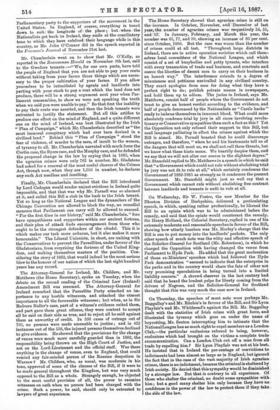The Attorney-General for Ireland, Mr. Childers, and Mr. Matthews (the
Home Secretary), spoke on Tuesday, when the debate on the second reading of the Criminal Law (Ireland) Amendment Bill was resumed. The Attorney-General for Ireland remarked that the Parnellite Party attached no im- portance to any hostile witnesses, and attached the utmost importance to all the favourable witnesses; but when, as in Sir Bedvers Bailer's case, part of a witness's evidence suited them, and part gave them great offence, they were content to accept all he said on their side as true, and to reject all he said against them as unworthy of credit. In 536 cases of outrage out of 765, no persons were made amenable to justice ; and in 422 instances out of the 536, the injured persons themselves declined to give evidence. He showed that the provisions for the change of venue were much more carefully guarded than in 1882, the responsibility being thrown on the High Court of Justice, and not on the Lord-Lieutenant and the official staff. Was there anything in the change of venue, even to England, that could remind any fair-minded person of the Russian despotism in Warsaw ? Mr. Childers, who, as usual, was moderate in his tone, approved of some of the clauses of the Bill, if it were to be made general throughout the Kingdom, but was very much opposed to the Bill as a whole. Strangely enough, he objected to the most useful provision of all, the power to examine witnesses on oath when no person had been charged with the crime. Such a power, he said, should only be entrusted to lawyers of great experience.


































 Previous page
Previous page